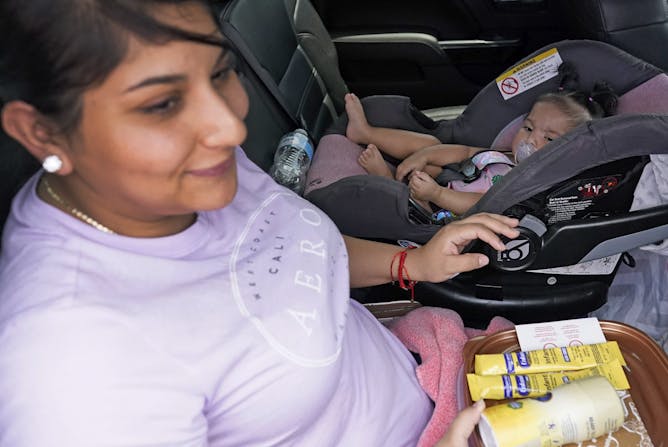|
The baby formula crisis that has left parents across the U.S. scrambling to find food for their newborns was a long time coming. And despite efforts to restock retailer shelves, severe shortages – which are disproportionately hurting low-income families – are unlikely to end anytime soon.
Closure of a key Abbott factory in Michigan in February set off the desperate hunts for formula after four babies were hospitalized and two died. Although the FDA may soon allow it to reopen, it will take at least two months before formula from the factory reaches consumers.
Kevin Ketels, a supply chain scholar at Wayne State University, explains why the baby formula industry was so vulnerable to a crisis like this and what could be done to prevent it from happening again.
Also today:
Do you listen to podcasts? The Conversation would like to hear about your favorites – and why you may not listen to them. Please take this five-minute survey.
|

Cities are trying to address the baby formula shortage with community drives.
AP Photo/David J. Phillip
Kevin Ketels, Wayne State University
The closure of a factory in Michigan is the incident that put new parents across the US on edge, but the real causes for the shortage of baby formula are many years in the making.
|
Health + Medicine
|
-
Sourav Sengupta, University at Buffalo
Psychotherapy is not one size fits all. From behavioral to gestalt therapies, which approach will work best for you depends on your needs and goals.
-
McKale Montgomery, Oklahoma State University
Proponents of intermittent fasting say the clock can help you win the battle of the bulge. But the science behind it is a little more complicated.
|
|
Environment + Energy
|
-
Daniel Macfarlane, Western Michigan University
Cleaning up the Great Lakes was a big job when the US and Canada undertook it in 1972. Today it’s far more challenging.
-
Imtiaz Rangwala, University of Colorado Boulder
La Niña is only part of the problem. The long-term driver of increasing drought – even in areas getting more rainfall overall – is the rapidly warming climate.
|
|
Education
|
-
Abigail A. Allen, Clemson University
The COVID-19 pandemic – and the isolation it brought on – deprived many babies of the stimulating experiences they need to develop. Is the damage permanent? A language specialist weighs in.
|
|
Politics + Society
|
-
Daniel J. Mallinson, Penn State
The three leading candidates in the GOP Senate primary race in Pennsylvania all hitched their wagons to Trump. But will that make it harder for the Republican winner to win the center come the fall?
-
Arie Kruglanski, University of Maryland
There is a mental and psychological dimension to what leads people to commit mass killings. But it is not mental illness or pathology.
|
|
Ethics + Religion
|
-
Gregory Grieve, University of North Carolina – Greensboro
A scholar of digital religion and Buddhism argues that not all Western Buddhism practice is inauthentic. Here’s a way to know what’s real.
|
|